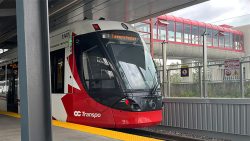Low ridership is a multi-pronged issue for Ottawa. For some residents, lack of reliability is the main deterrent for their participation. For public workers, remote work options mean there is no reason to take transit.
For some Ottawa residents like Max Patton, a part-time line cook, declining service quality and increasing fares have been enough to make him abandon OC Transpo altogether.
Patton says long wait times and unreliable service means he wouldn’t return to OC Transpo, even if fares were lowered. However, he believes transit should remain affordable for those who rely on it most.
Public transit costs in Canada have been steadily rising, yet ridership levels have not returned to pre-pandemic numbers. Capital Current’s analysis of the Statistics Canada Consumer Price Index (CPI) reveals that national public transit ridership generally has rebounded to 77 per cent of pre-pandemic levels, but Ottawa has only seen 63% of ridership return.
The federal government, the largest employer in the National Capital Region, has required public servants to return to the office three days a week, but there are, at present, no plans to go back to pre-pandemic in-person schedules.
This poses a particular challenge for the city, as the system is designed to accommodate public service workers. However, many government employees continue to work remotely post-pandemic, resulting in reduced revenues.
Announced last week, the City of Ottawa is to receive $180 million in funding for transportation from the federal government through the Canada Public Transit Fund over the next 10 years. The money will cover maintenance and equipment upgrades, not operations.
This means the money won’t directly improve service reliability or prevent future fare hikes.
With fewer riders and increasing operational costs, OC Transpo faces a $120 million deficit, including a $36 million immediate shortfall that must be addressed this year to prevent further service cuts. In the provincial election campaign, all three major parties are pledging to eases the cost burden on the city. The Progressive Conservatives would upload the service to Metrolinx, the provincial transit agency. The Liberals would upload the costs but aren't saying who would run the service. The NDP support a 50-50 cost sharing.
To help manage the financial strain, Ottawa City Council has approved a five per cent fare increase under the 2025 budget. The cost of an adult monthly pass has risen to $135 (from $125.50 in 2023), and a single-ride fare paid by card is now $4 (up from $3.75 in 2023). The EquiPass, Community Pass, and Access Pass will remain unchanged.
Capital Ward Councillor and Transit Commission member Shawn Menard says the extra revenue will help fill Ottawa’s immediate $36 million transit deficit but won’t lead to noticeable improvements for riders, like reliability and timeliness.
“To me, there isn't going to be any improvement to transit because extra funding will go to filling that hole,” said Menard.
Menard said he believes the Transit Commission should focus on how to get more riders.
“In order to do this (increase ridership), reliability and timeliness of the already present infrastructure must be improved,” he said.
Lines 2 and 4 of the O-train opened up on Jan. 6 which could start to bring some riders back.
Citizens like Patton believe that the price they pay for using OC Transpo is far above the value of the service itself. Instead, he relies on apps like Uber and Lyft to get around town on time.
The only two ways Patton says he would choose to switch back would be if there were higher standards for bus drivers and timeliness, or if more government resources were used to keep a higher standard of transportation in terms of cost and time.
“I’m fortunate enough now to be able to afford stuff like Uber which is cheaper than owning a car, but for people who don't have the luxury of being able to afford it, it’s like a slap to the face from those in positions of power.”
Patton does, however, believe that the bus fare should be cheaper.
“Public transportation needs to be easily accessible to the general public because the lower classes rely on it daily to get to and from work. Raising the prices is like exploiting them.”
He says even if OC Transpo lowered fares, he still probably wouldn’t change back because of the long wait and travel times.




